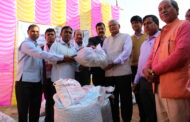ICAR-CIFT’s research publication entitled “Methicillin-Resistant Staphylococcus aureus in Seafood: Prevalence, Laboratory Detection, Clonal Nature, and Control in Seafood Chain” authored by Murugadas V, Toms CJ, Rao BM, Lalitha KV and Prasad MM in Journal of Food Science (Vol.84(12)/doi:10.1111/1750-3841.14915) has been highly acclaimed by Wiley, a premiere international publishing agency, as a top ranking downloaded and most read paper (2018-2019) in the category of Concise Reviews & Hypotheses in Food Science. The publication garnered vast attention across the scientific world within a month of the DOI for providing comprehensive information on Methicillin-Resistance Staphylococcus aureus (MRSA) in the food sector.
The paper dealt with the relevance of the pathogen Methicillin-resistant Staphylococcus aureus (MRSA) in fish, other food producing animals and its potential to cause food borne illness. The review provided the global picture of MRSA in fish and fishery products. Moreover, the discussion centered on the inconsistency in the protocol employed across the globe and their respective variations in the prevalence data ranged between 5% and 40%. This has also given insights on antimicrobial resistance observed and diversity of the clones across the world in the seafood sector. The review highlighted low resistance to chloramphenicol and glycopeptides in MRSA. Considering the fact that MRSA is not an inherent microbiota of fish and MRSA contamination in the food is attributed to pre-?or post-harvest contamination (fish handlers, water, ice, and processing equipment), an inclusive control strategy was proposed in the seafood production chain which is the limelight of the publication. The paper will be a ready reckoner for the budding researchers working in the field of seafood safety.
Further, the review provided information on the important initiatives of the Indian Council of Agricultural Research (ICAR) such as formation of INFAAR (Indian Network of Fisheries and Animal Antimicrobial Resistance) network in collaboration with the Food and Agriculture Organisation (FAO) to perform surveillance of antimicrobial resistance in animal production system, including aquatic animals, and devise strategies for combating antimicrobial resistance in pathogens associated with food production system through One Health approach. Finally, the paper has highlighted the step wise control measures to be followed in the entire seafood production chain for the benefit of all stakeholders.






